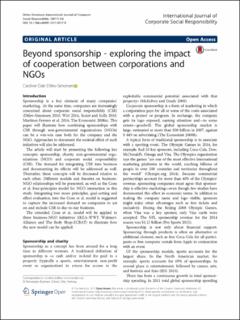Beyond sponsorship - exploring the impact of cooperation between corporations and NGOs
Peer reviewed, Journal article
Published version
Permanent lenke
https://hdl.handle.net/11250/2998500Utgivelsesdato
2017Metadata
Vis full innførselSamlinger
- Scientific articles [2173]
Originalversjon
International journal of corporate social responsibility. 2017, 2 . 10.1186/s40991-017-0017-9Sammendrag
Sponsorship is a key element of many companies’ marketing. At the same time, companies are increasingly concerned about corporate social responsibility (CSR) (Ditlev-Simonsen 2010, Wirl 2014, Scalet and Kelly 2010, Martínez-Ferrero et al. 2016, The Economist 2008a). This paper will illustrate how combining sponsorships with CSR through non-governmental organizations (NGOs) can be a win-win case both for the company and the NGO. Approaches to document the societal effect of such initiatives will also be addressed. exploitable commercial potential associated with that property» (McKelvey and Grady 2008). Corporate sponsorship is a form of marketing in which a corporation pays for all or some of the costs associated with a project or program. In exchange, the company gets its logo exposed, earning attention and—to some extent—goodwill. The global sponsorship market is large, estimated at more than $38 billion in 2007, against $ 449 on advertising (The Economist 2008b). The article will start by presenting the following key concepts: sponsorship, charity, non-governmental organizations (NGO) and corporate social responsibility (CSR). The demand for integrating CSR into business and documenting its effects will be addressed as well. Thereafter, these concepts will be discussed relative to each other. Different models and theories on businessNGO relationships will be presented, as well as the Cone et al. four-principles model for NGO interaction in this study. Integrating two more principles, goal-setting and effect evaluation, into the Cone et al. model is suggested to capture the increased demand on companies to act on and include CSR in day-to-day business. The extended Cone et al. model will be applied to three business-NGO initiatives (IKEA-WWF, WalmartAlliance and The Body Shop-ECBAT) to illustrate how the new model can be applied.

